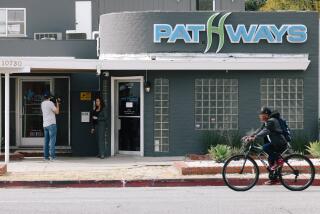‘Dr. Death’ Keeps Low Profile After 2 Women’s Deaths : Suicide: The Michigan ex-pathologist apparently violated a court order by helping more ill persons kill themselves. Officials are investigating.
- Share via
DETROIT — The man they call “Dr. Death” has struck again--but it was unclear Thursday whether the state will strike back at him.
While Michigan lawmakers still are grappling with issues raised last year by Dr. Jack Kevorkian’s so-called suicide machine, the retired pathologist apparently violated a court order Wednesday by helping two more women kill themselves.
Prosecutors say it may take six weeks for them to decide whether to file murder charges or contempt of court charges. Last February, a judge issued a permanent injunction banning Kevorkian from ever again helping anyone commit suicide.
Meanwhile, the usually loquacious and combative Kevorkian, who has portrayed himself as a courageous pioneer on the frontiers of medical ethics, is keeping a low profile.
He declined to talk to reporters early Thursday as he left Oakland County sheriff’s office, where he likewise had refused to answer the questions of detectives investigating the case.
“At this point we can’t even prove there’s been a crime committed,” said Capt. Glenn Watson of the Oakland County Sheriff’s Department.
Watson said Kevorkian, 63, dialed 911 at 7:05 p.m. Wednesday to report the deaths of two women. “He identified himself as Dr. Kevorkian and advised the communications agent that there had been a doctor-assisted double-suicide,” Watson said.
When sheriff’s deputies arrived at the rented cabin on Tamarack Lake in a recreational area about 40 miles north of Detroit, they found the two women--Marjorie Wantz, 58, of Sodus, Mich., and Sherrie Miller, 43, of Roseville, Mich.
Authorities said Miller died of apparent carbon monoxide poisoning, while Wantz used a device that delivered a lethal injection. They both were still connected to death-dealing devices when deputies arrived.
Also at the scene were Kevorkian; his sister, Margo Janus; his lawyer, Michael Schwartz; William Wantz, the husband of one of the dead women, and Sharon Welch, a friend of Miller’s.
“On the advice of his attorney, (Kevorkian) refused to make any statement,” Watson said. “We are going to treat it as a homicide, mainly because we can’t get any information from anybody.”
On Thursday, Geoffrey Fieger, another of Kevorkian’s attorneys, told reporters that Wantz suffered from a pelvic disease that caused debilitating pain and Miller from multiple sclerosis and that both women had been among dozens who had beseeched Kevorkian to help them end their suffering.
Fieger told reporters he hopes no charges will be filed.
“I would hope that the prosecutor learns from his first mistake,” he said, referring to a murder charge that was dismissed against Kevorkian last year, after he assisted in his first suicide in Michigan.
Kevorkian admitted helping Janet Adkins, an Oregon woman, kill herself in 1990 by using a contraption he invented that releases chemicals into the bloodstream. A similar device was used Wednesday by Miller.
A judge dismissed the murder charge on the grounds that Michigan has no law banning suicide and prosecutors had failed to prove that Kevorkian was the cause of Adkins’ death.
Twenty-seven states ban assisted suicide; four others ban suicide or assisted suicide. A measure on the November ballot in Washington state would allow doctor-assisted suicide.
Fieger released a suicide note from Wantz that read in part: “This is my decision and no one else’s. After three and one-half years I find I can no longer go on with this pain and agony. I have not been out of the house in three years except to go to Detroit to see my doctor. I don’t call this living.”
Darvin Hartness, who lives two houses from the suburban Detroit home Miller shared with her parents, told the Associated Press that “I’m surprised it took this long. Sherry wanted to do it. She was just too dependent on her parents.”
Millie Gast, a neighbor in the quiet trailer park where Wantz lived, told The Herald-Palladium of Benton Harbor that “I bless the doctor, I really do. I’ve seen the woman in so much pain. I hope they don’t do anything to him.”
Michael J. Modelski, assistant Oakland County prosecutor, said his office will consider the earlier ruling in determining whether to file new murder charges.
But he added: “Right now we really don’t have any idea of what happened in that cabin. . . . We don’t know exactly how these people died.”
Until the medical examiner’s toxicology reports are finished and the sheriff’s department completes its investigation, “We can’t say whether or not the injunction (against Kevorkian) was violated either,” Modelski said.
“Until we get the medical examiners report on the causes of death, we don’t know what happened.”
When the murder charge was filed last year, Oakland County prosecutor Richard Thompson said he wanted to discourage others from coming to Michigan to commit suicide.
When the charge was dismissed, he urged the state Legislature to pass a law clarifying the legal issue before the state became a suicide mecca.
The Michigan state Senate passed a bill making it a felony punishable of up to four years in prison to assist another in committing suicide, but the bill has languished in the House judiciary committee.
“Unfortunately, the concerns expressed by Mr. Thompson in December have come to fruition,” Modelski said Thursday.
Shortly after Adkins’ death, in a separate incident, a terminally ill California woman flew to Michigan with her husband and daughter so that they could help her commit suicide.
The husband was charged with murder. A jury found him innocent earlier this year in a decision hailed by right-to-die advocates.
Modelski lamented that publicity surrounding these new deaths will likely encourage others to seek Kevorkian’s help.
More to Read
Sign up for Essential California
The most important California stories and recommendations in your inbox every morning.
You may occasionally receive promotional content from the Los Angeles Times.












